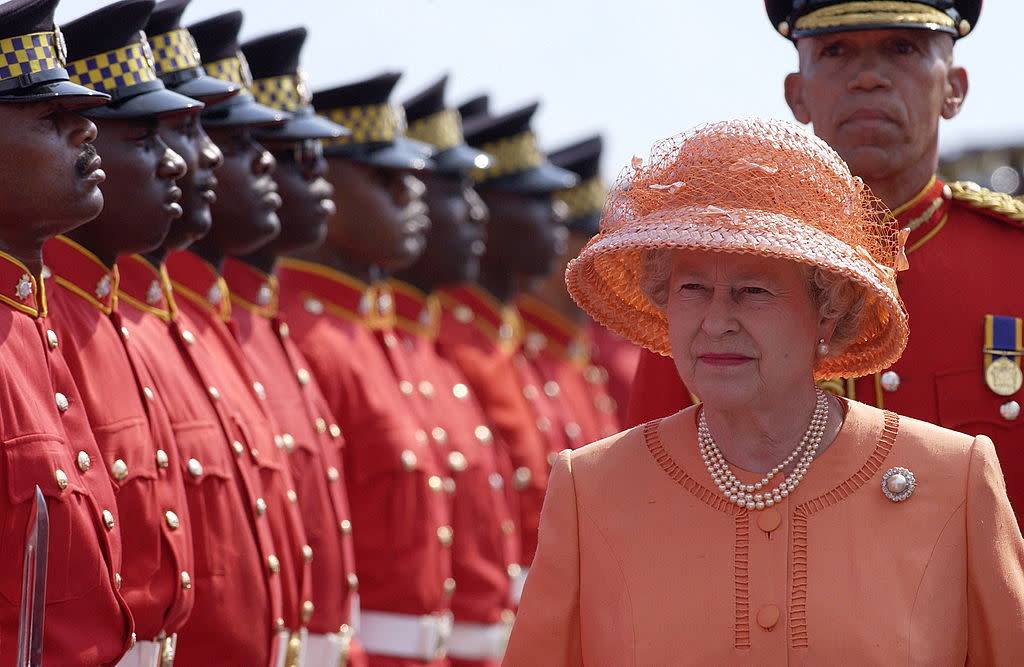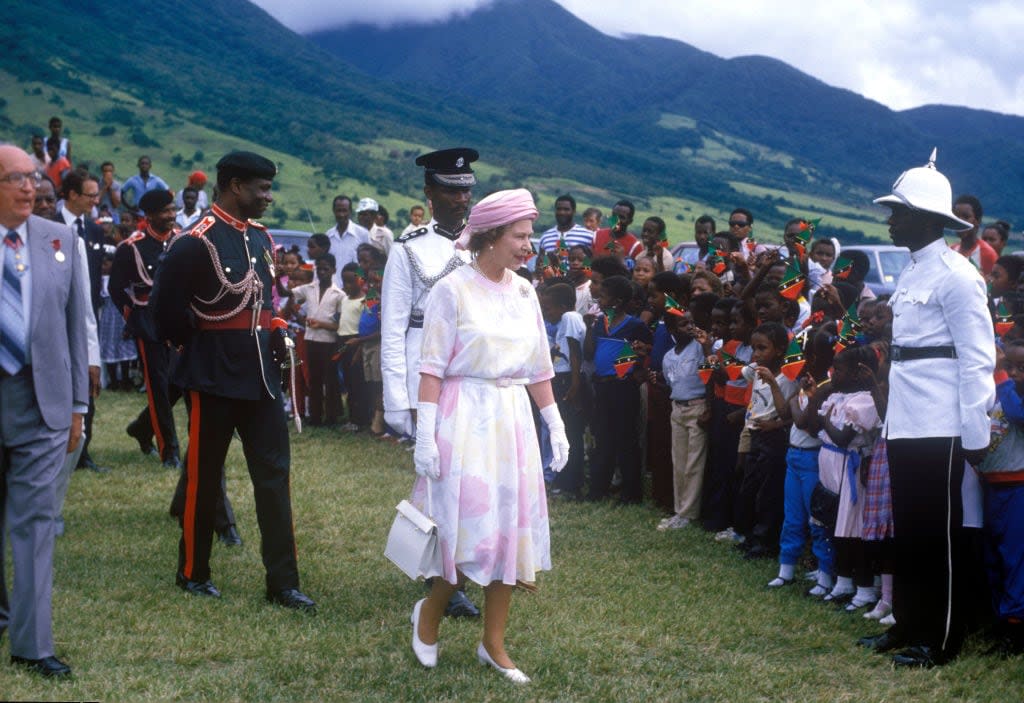How will the Commonwealth remember Queen Elizabeth II: Paragon or parasite?
OPINION: Four women from countries across the Commonwealth reveal their feelings about the complicated legacy of the queen and what her death means to the future of the monarchy.
Editor’s note: The following article is an op-ed, and the views expressed are the author’s own. Read more opinions on theGrio.
Is it possible to call a transition 70 years in the making a shock? Thursday’s announcement that Her Majesty Queen Elizabeth II died peacefully that afternoon left the United Kingdom and much of the world reeling. Despite a limited public schedule and an increasingly frail visage, it was hard to believe that the monarch, who had just days earlier anointed her 15th British prime minister, had taken her last breath. Only three months after the Platinum Jubilee celebrations marking the queen’s 70th year as sovereign, her son, King Charles III, takes his place on the throne.
What was supposed to be a joyous jubilee year was instead marred by cash-for-access scandals, sex trafficking lawsuits, and family infighting. I interviewed four women from countries across the Commonwealth to understand how they viewed the queen’s enduring legacy and what her death means for the future of the monarchy. Was she still a relevant figure in national life? Did the reverence for Queen Elizabeth as a unifying force ring hollow among those calling for reparations for the descendants of the enslaved? Most importantly, would the goodwill bestowed on the late monarch extend to her heir and a family known more for scandals than service in recent years?

Queen Elizabeth was a woman leading on the world stage when there were few in the highest echelons of power. Her transformation from a princess, with a very traditional focus on marriage and motherhood, to a monarch represents WWII-era feminism that resonates with young women today. Black British brand strategist Collette Philip, 43, likened the queen to a “kind, slightly mischievous and strong matriarch like my own Nana, who is the same age.”
For Alicia Johnson, 36, another Black Brit who grew up in an “unfashionable part of London that had never seen a royal visit,” the royal family was an afterthought. Watching the queen’s annual Christmas speech or Trooping the Colour wasn’t part of her family’s traditions, so how could this symbol of national identity and patriotism represent her and her community?
At 80 years old, retired educator Kamala Jean Gopie’s life has spanned the entirety of the queen’s reign, yet she experienced that same feeling of detachment. As an Indo-Jamaican schoolgirl, when Jamaica was still a British colony, she waved her Union Jack flag and sang “Land of Hope and Glory” to usher in Queen Elizabeth’s coronation in 1952. The thrill of viewing fireworks for the first time stayed with her, but so did Gopie’s resentment. Why were they celebrating someone so far removed from her own life? “It had nothing to do with us,” she recalled. It was a criticism not dissimilar to what William and Kate, the prince and princess of Wales, received during their recent Platinum Jubilee tour of Jamaica.
Too often, colonialism and the British royal family’s role in aggrandizing it are characterized as the distant past rather than living history. Writer and entrepreneur, Abadesi Osunsade, 34, grew up hearing stories about her father’s childhood in Nigeria like the time he met the queen during her visit to his school. Nigeria was still a British colony at the time, and Osunsade said that her father’s story “represents the complex relationship Black people have with Queen Elizabeth II.” Meeting the queen in person was a rare honor for her father, but it also felt strange for him as a Black student to sing praise songs to a white queen. The mixture of pride and discomfort that he expressed when recounting the story was something Osunsade says she will always remember.

Gopie’s feelings about Queen Elizabeth and the institution of monarchy are much less conflicted. Her grandparents and great-grandparents were taken from India to Jamaica as indentured laborers. She described the monarchy as “an unjust, unequal system lacking any kind of merit that has exploited people around the world for its benefit.” Rather than creating a symbiotic relationship with the Commonwealth, the Caribbean sugar and coffee trades fueled the Industrial Revolution but the islands were left with little to show for it. In Gopie’s view, the queen was merely “a gracious parasite” siphoning off countries’ labor and resources with a smile. Gopie joked, “I would do my job very well. I could smile at whomever,” if she were paid to do it.
As more people learn the unfiltered history of the British Empire, it’s hard for Philip to reconcile the nostalgic image of the “benevolent, prosperous empire” with reality. She believes that one of the queen’s failings was her refusal to “acknowledge, much less address the colonial oppression that her sovereignty has represented and endorsed.” Instead, a social hierarchy that places ordinary people firmly at the bottom and (inherited) wealth at the top was simply reinforced. The indentured labor and subsidization of the British economy just continued in more modern forms like the forced deportation of Windrush migrants.
While the queen remained silent on these issues, both King Charles and Prince William have condemned Britain’s role in the slave trade as an atrocity. A step forward but still far short of the apology and financial reparations that the Caribbean Reparations Commission sought. Gopie put it succinctly, “Don’t tell me slavery was a bad thing when your family enriched itself from it. And if it was a bad thing then you recompense for what it cost their society when you stripped it clean.”
In his first public address, King Charles pledged to serve “with loyalty, respect, and love,” but the benign apathy that served Queen Elizabeth so well is unlikely to extend to him in full measure. With Jamaica and at least five other Caribbean countries signaling that they’re going to follow Barbados’ lead and become republics in the coming years, he is inheriting a realm that will be decidedly smaller and less stable.
The U.K. may not be ready for a republic but reform is needed for an institution that Philip characterizes as “resistant to change and willing to prioritize tradition over justice.” Can a 73-year-old king be the modernizing force that the institution needs or is he merely keeping the seat warm? Charles has achieved his slimmed down monarchy, though perhaps not in the way he intended. But, does it feel any more representative of the people in the Commonwealth, a diverse population with more than 60 percent under age 30? To that end, he has charged Prince William with “helping to bring the marginal to the center ground” in his role as prince of Wales. Can the first in line convincingly denounce the institution’s colonial past while engaged in open warfare with his brother’s interracial family?
These are the challenges that will determine the success of King Charles’s reign. It may prove to be a tumultuous era if not a particularly long one.

R.S. Locke is a multimedia journalist and entrepreneur. Staying positive but petty is a personal creed that underscores her writing and her life. She writes about the world’s longest-running reality series and family business – the British Royal Family.
TheGrio is FREE on your TV via Apple TV, Amazon Fire, Roku, and Android TV. Please download theGrio mobile apps today!
The post How will the Commonwealth remember Queen Elizabeth II: Paragon or parasite? appeared first on TheGrio.
